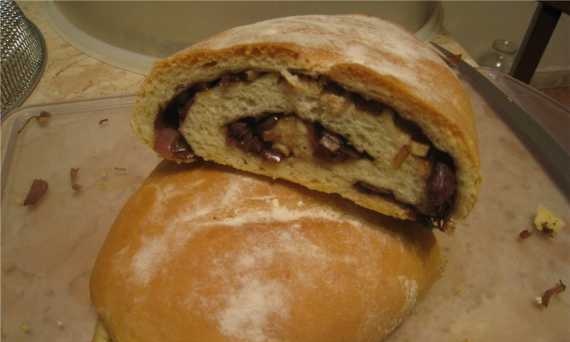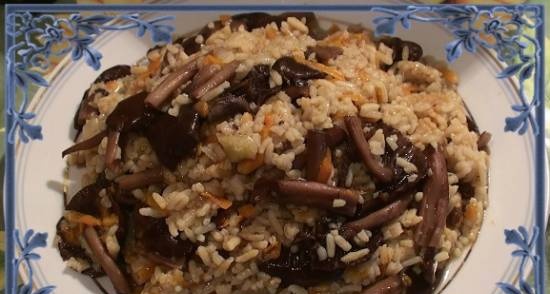|
 The ancient inhabitants of Hellas had a funny custom. Pour vegetable oil on the guests' heads. And the guest was not offended. On the contrary, he was very flattered. The more poured, the better I felt (the more you pour, the more you respect!). At solemn ceremonies, the heads of the most honored guests were anointed with oil. And even kings. The ancient inhabitants of Hellas had a funny custom. Pour vegetable oil on the guests' heads. And the guest was not offended. On the contrary, he was very flattered. The more poured, the better I felt (the more you pour, the more you respect!). At solemn ceremonies, the heads of the most honored guests were anointed with oil. And even kings.
Lily is certainly not in vain. It was believed that the oil strengthens the hair, rejuvenates the scalp. And not only heads. In the Middle East and Africa, they rubbed the whole body whenever possible. However, many have preserved this ritual to this day.
We, of course, find it difficult to imagine how one can walk with oiled up. You will be all sticky, the clothes will stick. And even the spots will remain. However, one daredevil was found and in 1976 he decided to try the Arab ritual on himself. For some time he anointed himself with oil and found out that it does not linger on the skin, but is immediately absorbed. And from this the body does not become sticky and greasy. On the contrary, it becomes velvety, elastic and very fresh.
From time immemorial, olive was considered the best vegetable oil. And most useful. No wonder so many attempts have been made to grow an olive tree (olive tree) where it did not grow. The British tried to approve it on their islands. It took root well. Bloomed luxuriously. But it did not bear fruit. In the damp climate of foggy Albion, the pollen got wet and pollination was disrupted. The British, practical people, managed to use the landings for another purpose. They turned them into their favorite living fences. But, alas, it was not possible to get oil. Their mistake was repeated by the Americans in Florida. The Florida Peninsula is wet too. The same embarrassment came out with the fruits there. And the Americans, it seems, were not interested in living fences.
True, the Americans did not have much need for their own olive oil. Europe supplied the New World with this product in abundance. But the second world war began. Oil from Europe did not come. It was replaced with cheaper varieties. And suddenly, in the first post-war years, it again shone on the American market. The labels read "20% olive oil." Experts took a sample and said: "Something is hard to believe, nothing other than a fake!" And they sent it to the laboratory for analysis.
There was a very precise way to define it. Olive oil contains a special substance - squalene. In other oils, it is not enough. The analysis justified the hucksters. The new product contains just as much squalene as it should be. Connoisseurs were at a loss. And then, quite by chance, they learned that a certain gangster company was buying squalene, which remains an unnecessary waste at the vitamin factory. Why buy? Surely not for mixing in vegetable oil? Chemists secretly marked squalene with harmless acid and discovered a fake. There was not a single gram of olive oil in the mix.
 Of course, the olive is famous not only for oil. Its fruits, the olives from which the oil is pressed, are very tasty in themselves. Not only people adore them. Birds too. Thrushes and magpies like fatty, juicy flesh. They throw away the stone and thus act as sowers of olive trees. Gnarling birds do the opposite. They eat out the bone. They are of little use to the olive tribe. Mice also specialize in bones. Of course, the olive is famous not only for oil. Its fruits, the olives from which the oil is pressed, are very tasty in themselves. Not only people adore them. Birds too. Thrushes and magpies like fatty, juicy flesh. They throw away the stone and thus act as sowers of olive trees. Gnarling birds do the opposite. They eat out the bone. They are of little use to the olive tribe. Mice also specialize in bones.
There is one more, third usefulness of olive. It survives where the soil is dry as stone and where no other tree grows. If you go from Baku airport to the city, then the road runs through such a dry, barren area. The land is dry and salty. Oliva helps out here too. She is the only deciduous tree that can live almost without water. Its grayish, dusty leaves may not be very beautiful, but they perfectly endure the fierce glow of the sun's rays.
All the power of olive, perhaps, not only in the leaves, but also in the roots. No tree has such roots.They are like a tangled ball of gigantic dimensions and always amazed travelers when the wind exposed them, blowing the soil from under the base of the tree. Thanks to such a successful design, the olive tree intercepts moisture from any neighbors. The ancients knew this and never dared to plant a dry-loving tree in the vineyards. Otherwise they were left without grapes. A fig tree was planted instead of an olive. The thick tent of the fig tree foliage, although it obscured the light from the vines, but protected from the heat and retained the necessary moisture.
The world collects very few olives. It gets even less oil. If divided among the inhabitants of the planet, each would get half a bottle. If you look at the map, it is not difficult to notice a curious thing. The lion's share of olives is grown along the shores of the Mediterranean Sea. The climate for a tree with gray leaves is the most suitable here. Most of the olives are harvested in Italy and Spain. And they eat more of them there than in other countries. Salted. Pickled. They are eaten with bread and wine. Even the cheese is soaked in olive oil. This is the same La Manche cheese that was made in the days of Don Quixote. Since then, he has not changed at all.
A. Smirnov. Tops and roots
Read now
All recipes
|
 The ancient inhabitants of Hellas had a funny custom. Pour vegetable oil on the guests' heads. And the guest was not offended. On the contrary, he was very flattered. The more poured, the better I felt (the more you pour, the more you respect!). At solemn ceremonies, the heads of the most honored guests were anointed with oil. And even kings.
The ancient inhabitants of Hellas had a funny custom. Pour vegetable oil on the guests' heads. And the guest was not offended. On the contrary, he was very flattered. The more poured, the better I felt (the more you pour, the more you respect!). At solemn ceremonies, the heads of the most honored guests were anointed with oil. And even kings.


























































